Hops in Beer Brewing: Pacific Jade
Published: September 18, 2025 at 8:46:58 PM UTC
Beer brewing is an art that heavily relies on the quality and characteristics of its ingredients, with hop varieties being a key component. Among these, Pacific Jade stands out for its unique flavor profile and bittering capabilities. Bred by HortResearch Centre in Riwaka, NZ, and released in 2004, Pacific Jade has quickly become a favorite among brewers. Its high alpha acid content and balanced oil composition make it suitable for a wide range of beer styles. This includes everything from pale ales to stouts.
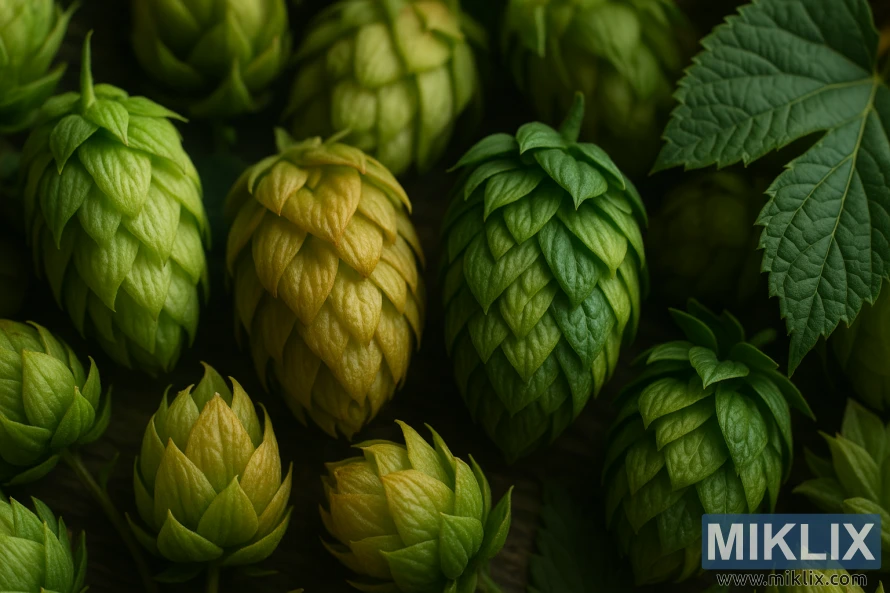
Key Takeaways
- Pacific Jade is a triploid hop variety known for its unique flavor and bittering capabilities.
- It was bred by HortResearch Centre and released in 2004.
- The hop variety is versatile and can be used in multiple beer styles.
- Its high alpha acid content and balanced oil composition are notable characteristics.
- Pacific Jade is a popular choice among brewers due to its characteristics.
Introduction to Pacific Jade Hops
In the early 2000s, the HortResearch Centre in Riwaka, New Zealand, successfully bred Pacific Jade hops. This variety would later become a favorite among brewers for its unique characteristics.
Pacific Jade hops were officially released in 2004, marking a significant milestone in New Zealand's hop breeding program. They are a triploid hop variety, resulting from a cross between a First Choice female and an Old Line Saazer male. This parentage contributes to Pacific Jade's distinct flavor and aroma profile, making it a valuable addition to various beer styles.
The triploid nature of Pacific Jade hops means they are sterile and seedless, a trait that simplifies their cultivation and harvesting. This characteristic, combined with their unique flavor and aroma properties, has made Pacific Jade a sought-after hop variety in the brewing industry.
As a product of New Zealand's innovative hop breeding efforts, Pacific Jade represents a blend of traditional and modern brewing qualities. Its development highlights the country's contribution to the global hop market and its influence on brewing practices worldwide.
Chemical Composition and Characteristics
For brewers, grasping the chemical makeup of Pacific Jade hops is key. These hops stand out with an alpha acid range of 12-14%. This makes them ideal for adding bitterness to beer. The alpha acids are responsible for the beer's bitterness and stability.
The oil composition of Pacific Jade hops is also vital. It includes myrcene, humulene, and caryophyllene. These elements create a balanced flavor and aroma. Myrcene brings a herbaceous and woody taste. Humulene adds a spicy and woody note. Caryophyllene, with its woody and spicy flavor, enhances these, leading to a complex yet balanced hop profile.
Pacific Jade hops' high alpha acid and balanced oil composition make them versatile. They can be used for both bittering and flavor/aroma additions. This versatility allows brewers to craft beers with unique flavor profiles and bitterness levels.
- Alpha acid content: 12-14%
- Main oil components: myrcene, humulene, caryophyllene
- Flavor and aroma contributions: herbaceous, woody, spicy
In summary, Pacific Jade hops' chemical makeup is appealing to brewers aiming to create diverse beer styles. Their balanced profile and high alpha acid content add complexity and flexibility. This enhances both the brewing process and the final beer.
Aroma and Flavor Profile of Pacific Jade Hops
Pacific Jade hops bring a bold, spicy aroma to various beer styles. Their unique scent is a mix of fresh citrus, black pepper, and herbal notes. This blend creates a complex flavor profile.
The citrus notes add a bright, refreshing quality. Black pepper introduces a subtle spiciness, enriching the taste. Herbal undertones add to the complexity, making Pacific Jade hops versatile for brewers.
Pacific Jade hops are celebrated for their bold, complex flavor. Their spicy, citrus, and herbal notes are perfect for a wide range of beers. This includes IPAs to pale ales.
In brewing, Pacific Jade hops enhance the flavor and aroma of beer. Their distinct characteristics are a favorite among brewers. They aim to craft unique, complex beers.
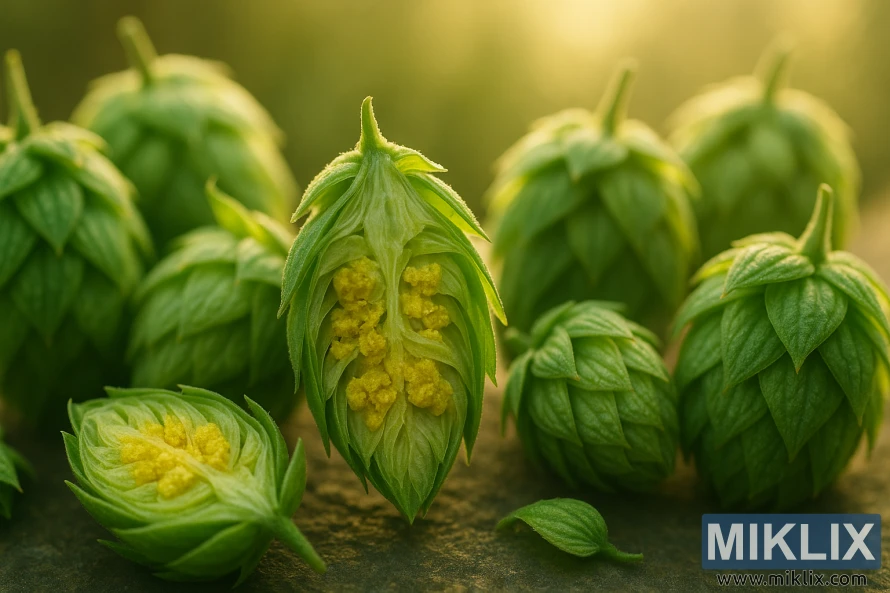
Growing Regions and Availability
Pacific Jade, a renowned hop variety, originates from New Zealand's thriving hop industry. The country's climate and geography are perfectly suited for hop cultivation. The majority of Pacific Jade hops are grown in the Nelson region. This area boasts rich soil, a moderate climate, and plenty of sunlight, creating an ideal environment for hop growth.
The global availability of Pacific Jade hops is more limited compared to other varieties. This can pose a challenge for brewers seeking them. Yet, their distinct flavor and aroma make them highly desirable among craft brewers. It's essential for brewers to understand the growing regions and availability to incorporate Pacific Jade into their recipes.
The availability of Pacific Jade hops can fluctuate annually. This is due to factors like crop yield and demand. Brewers aiming to use Pacific Jade hops should plan ahead. They should also source from reputable suppliers who import from New Zealand.
- Primary growing region: Nelson, New Zealand
- Characteristics: Ideal climate and soil for hop cultivation
- Global distribution: Limited, but sought after by craft brewers
Best Beer Styles for Pacific Jade Hops
Pacific Jade hops offer a balanced profile, making them ideal for a wide range of beer styles. Their high alpha acid content and balanced oil composition result in a clean, smooth bitterness. This characteristic is perfect for brewers aiming to create diverse beers.
These hops are a standout choice for pale ales and IPAs. Their bitterness and flavor profile are well-suited for these styles, providing a balanced hop character. For example, in pale ales, Pacific Jade hops add a subtle hop flavor without dominating the malt profile.
Not only are Pacific Jade hops great for pale ales and IPAs, but they also excel in lagers and stouts. In lagers, they introduce a crisp bitterness that enhances the beer's clean character. In stouts, they add depth and complexity, balancing the richness of roasted malts.
Some of the key beer styles that Pacific Jade hops are suited for include:
- Pale Ales: Adding a subtle hop flavor and clean bitterness.
- IPAs: Providing a balanced hop character and smooth bitterness.
- Lagers: Contributing a crisp bitterness that complements the beer's clean character.
- Stouts: Adding depth and complexity by balancing the richness of roasted malts.
Understanding Pacific Jade hops' characteristics and their interaction with various beer styles allows brewers to explore new recipes and techniques. This versatility makes Pacific Jade hops a valuable asset for any brewer's hop collection.
Brewing Techniques and Timing
The art of brewing with Pacific Jade hops requires understanding the best techniques and timing. These hops are versatile, suitable for all hop additions, from bittering to dry hopping. This versatility allows brewers to experiment with different techniques to achieve the desired flavor and aroma.
When using Pacific Jade hops for bittering, their high alpha acid content provides a clean and smooth bitterness. The boil time for bittering additions can vary. Typically, Pacific Jade hops are added early in the boil to maximize their alpha acids. For flavor and aroma additions, later boil times or even flameout additions can be used to preserve the hop's unique characteristics.
Here are some key considerations for brewing techniques and timing with Pacific Jade hops:
- For bittering, add Pacific Jade hops early in the boil, typically within the first 30-60 minutes.
- For flavor additions, consider adding Pacific Jade hops in the last 15-30 minutes of the boil.
- For aroma, Pacific Jade hops can be added at flameout or during the whirlpool.
- Dry hopping with Pacific Jade hops can add a complex and interesting aroma to the beer.
The timing of hop additions is critical in achieving the desired balance of bitterness, flavor, and aroma. By adjusting the brewing techniques and timing, brewers can tailor their beer's profile to suit their preferences. Whether used for bittering, flavor, or aroma, Pacific Jade hops offer a unique and valuable contribution to the brewing process.
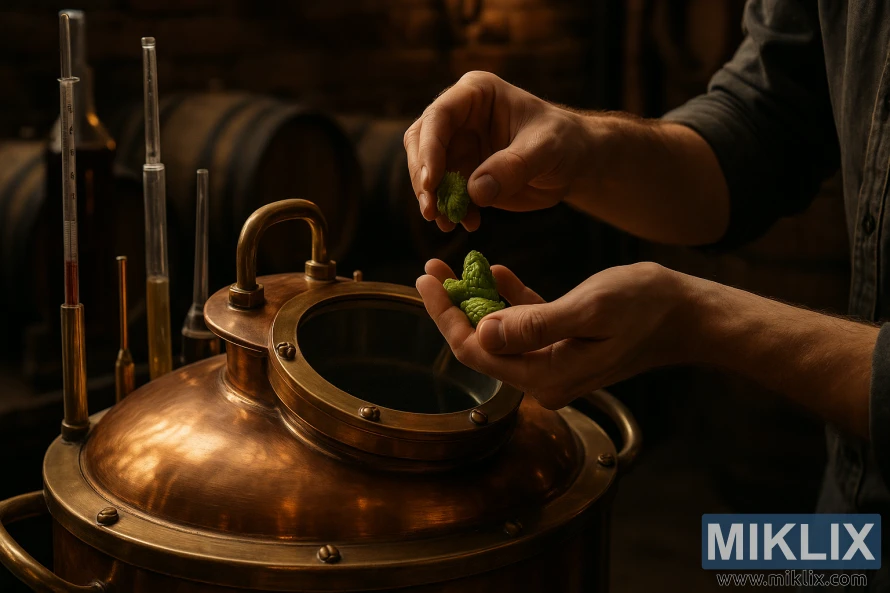
Bittering Properties and IBU Contribution
Pacific Jade is celebrated for its high alpha acid content, making it a top choice for brewers. Its alpha acid levels, usually between 13-15%, ensure a robust bitterness without sacrificing flavor. This makes it ideal for those aiming to craft beers with a strong bitter profile.
The bitterness imparted by Pacific Jade hops is clean and smooth. This is due to their unique chemical makeup. They are perfect for a wide range of beer styles where a bold bitterness is key. For brewers, understanding IBU and bitterness calculation is critical to harness Pacific Jade's full flavor.
To fully exploit Pacific Jade's bittering capabilities, brewers must consider several factors. These include boil time, hop utilization, and the wort's specific gravity. Bittering hops, like Pacific Jade, are best added early in the boil. This allows for the necessary isomerization of alpha acids, which enhances the beer's bitterness.
- High alpha acid content for robust bitterness
- Clean and smooth bitterness profile
- Suitable for various beer styles requiring pronounced bitterness
By utilizing Pacific Jade's bittering properties, brewers can craft complex, balanced beers. These showcase the unique characteristics of these hops, elevating the beer's overall quality.
Dry Hopping with Pacific Jade
Pacific Jade hops bring a unique twist to dry hopping, adding depth and complexity to beers. Their use in dry hopping can significantly enhance a beer's flavor and aroma. This makes them a standout choice for brewers aiming to craft distinctive brews.
These hops are renowned for their high oil content, ideal for dry hopping. Their complex flavor profile contributes a bright, refreshing quality to the beer. This makes Pacific Jade hops perfect for brewers seeking to create beers with unique aroma characteristics.
To maximize the benefits of dry hopping with Pacific Jade, brewers should follow some key practices. The timing of dry hopping is critical. It's usually done towards the end of fermentation or after it's complete. The amount of hops used can vary, depending on the desired intensity of flavor and aroma.
- Use a sufficient quantity of Pacific Jade hops to achieve the desired flavor and aroma.
- Monitor the dry hopping time to avoid over-hopping, which can lead to undesirable flavors.
- Consider combining Pacific Jade with other hop varieties to create a unique and complex flavor profile.
By mastering these techniques, brewers can effectively incorporate Pacific Jade hops into their dry hopping processes. This results in beers with enhanced and complex flavor profiles.
Storage and Handling Requirements
Pacific Jade hops demand careful storage and handling to prevent degradation. Their high oil content makes them susceptible to oxidation and spoilage. Proper storage is essential to maintain their brewing value.
To preserve the quality of Pacific Jade hops, store them in a cool, dry place. This location should be away from direct light and moisture. Such conditions help in preserving their unique aroma and flavor.
- Storing hops in airtight containers or vacuum-sealed bags to prevent exposure to air.
- Keeping the storage area at a consistent refrigerated temperature.
- Minimizing the handling of hops to reduce exposure to heat and light.
By adhering to these guidelines, brewers can ensure Pacific Jade hops remain of high quality. This ensures they contribute to the production of exceptional beers.
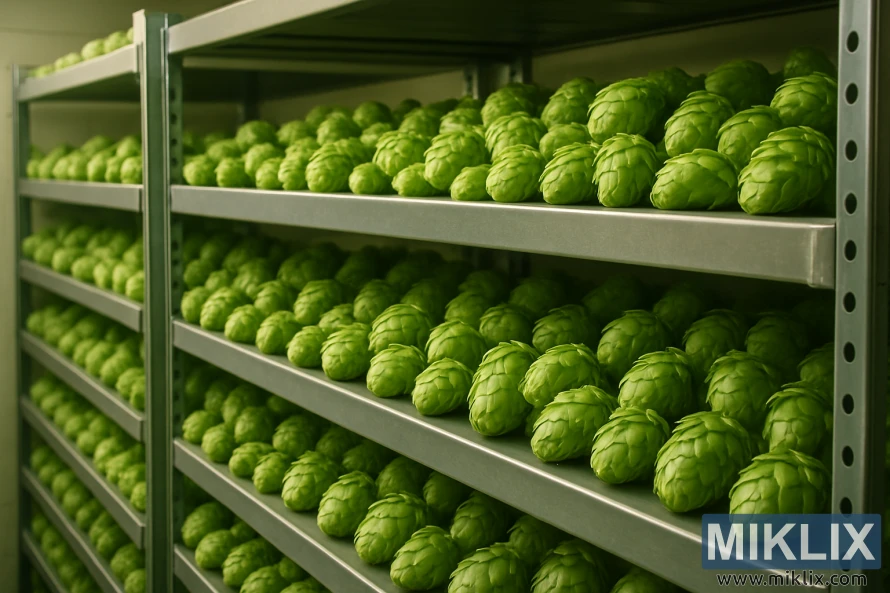
Compatible Hop Combinations
Pacific Jade hops are a key player in crafting complex beer flavors. Their unique taste and aroma make them perfect for blending with other hops. This combination can elevate the overall character of a beer, appealing to a broad audience.
Pacific Jade hops pair well with several hop varieties. This versatility allows brewers to experiment with various flavor profiles. The result is a beer that is both complex and balanced.
- Citra, for its citrus notes that complement Pacific Jade's subtle fruitiness.
- Nelson Sauvin, which adds a distinctive white wine and fruit flavor.
- Cascade, a classic American hop variety that contributes a floral and slightly bitter taste.
By combining Pacific Jade with other hops, brewers can create unique and intriguing beers. This approach not only enhances the beer's character but also caters to a diverse range of palates. It's a great way to push the boundaries of brewing and create something truly special.
Common Brewing Challenges and Solutions
Brewing with Pacific Jade hops demands careful attention to detail to avoid common issues. The high oil content in these hops makes them susceptible to oxidation and spoilage. This is a major concern if not stored correctly.
To address these concerns, brewers should adhere to several best practices. Here are some key considerations:
- Store Pacific Jade hops in a cool, dry environment to preserve their flavor and aroma compounds.
- Use airtight containers to prevent exposure to oxygen, which can cause the hops to degrade.
- Monitor the hops for signs of spoilage, such as off-flavors or unpleasant aromas.
When brewing with Pacific Jade hops, it's also essential to be mindful of their bittering properties and how they interact with other ingredients in the brew. Some common challenges include:
- Balancing the bitterness level to achieve the desired flavor profile.
- Optimizing the hop addition timing to maximize the aroma and flavor contributions.
- Ensuring consistency across batches by maintaining consistent hop storage and handling practices.
By understanding these challenges and implementing effective solutions, brewers can unlock the full flavor of Pacific Jade hops. This way, they can create high-quality beers that showcase their unique characteristics.
Recipe Development Guidelines
Pacific Jade hops stand out for their unique flavor and aroma, making them perfect for a variety of beers. They can add depth and complexity to beers ranging from pale ales to stouts. This versatility makes them a favorite among brewers.
Developing beer recipes with Pacific Jade hops requires careful consideration. Here are some key guidelines to keep in mind:
- Understand the alpha acid content and how it contributes to bitterness.
- Balance the flavor and aroma profile with other ingredients.
- Experiment with different brewing techniques to optimize hop utilization.
Pacific Jade hops are incredibly versatile. They can be used in various stages of brewing, from bittering to aroma additions. Their moderate alpha acid content is ideal for bittering. Their unique flavor and aroma make them perfect for late additions.
When developing recipes with Pacific Jade hops, consider these points:
- Determining the optimal hop addition times to achieve the desired flavor and aroma.
- Balancing Pacific Jade hops with other hop varieties to create complex profiles.
- Adjusting brewing parameters, such as temperature and pH, to optimize hop extraction.
By following these guidelines and experimenting with Pacific Jade hops, brewers can craft innovative and delicious beers. These beers will showcase the unique characteristics of this versatile hop variety.
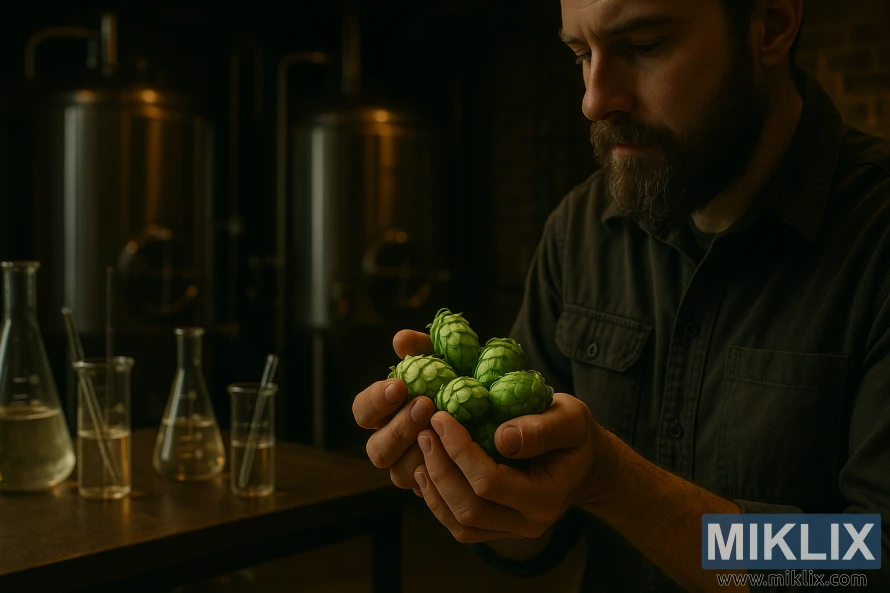
Commercial Beer Examples Using Pacific Jade
Pacific Jade hops showcase their versatility in a variety of commercial beers, from pale ales to stouts. Breweries have been exploring Pacific Jade to craft unique flavor profiles. These appeal to a broad spectrum of consumers.
Pale ales and IPAs benefit from Pacific Jade's citrus and floral notes. It also enhances stouts and porters, adding depth and complexity to darker beer styles.
The use of Pacific Jade in commercial beers highlights its adaptability and creative possibilities for brewers. By incorporating Pacific Jade, breweries can differentiate their offerings. This attracts consumers seeking new and exciting beer experiences.
- Pacific Jade adds a unique flavor profile to pale ales and IPAs.
- It is used in stouts and porters to add complexity.
- The hop's versatility makes it suitable for a variety of beer styles.
These commercial beer examples using Pacific Jade hops inspire brewers to experiment with this versatile hop variety. By understanding Pacific Jade's use in different beer styles, brewers can craft unique recipes. These can stand out in the market.
Substitutes and Alternatives
Several hop varieties can serve as substitutes for Pacific Jade hops in brewing. Pacific Jade hops are known for their distinct characteristics, making them a favorite among brewers. Their availability can be a challenge, but other hop varieties can provide similar qualities.
Citra and Nelson Sauvin hops are recognized as viable substitutes. They offer comparable aroma and flavor profiles. Citra hops provide citrus and tropical fruit notes. Nelson Sauvin offers a unique combination of white wine and fruit flavors.
- Mosai hops, with a complex blend of fruit and spice flavors.
- Riwaka hops, known for their intense tropical fruit and citrus characteristics.
- Simcoe hops, which can add a piney and earthy tone to beers.
When substituting Pacific Jade hops, brewers should consider the specific characteristics of the replacement hop variety. Experimenting with different hop combinations can lead to the creation of unique beer styles.
Conclusion
Pacific Jade hops have proven to be a versatile and unique addition to various beer styles. They offer brewers a valuable tool for creating complex and interesting beers.
By understanding the characteristics, uses, and best practices for Pacific Jade hops, brewers can unlock their full potential. They can craft high-quality beers that showcase their distinct flavor and aroma profile.
Incorporating Pacific Jade into brewing recipes can elevate the overall quality of the beer. It makes it a worthwhile consideration for brewers looking to innovate and experiment with new flavors.
As a conclusion to our exploration of Pacific Jade hops, it's clear that this variety brings a unique set of attributes to the brewing process. It makes it an exciting ingredient for craft brewers to work with, providing a foundation for final thoughts on its applications.
Further Reading
If you enjoyed this post, you may also like these suggestions:
